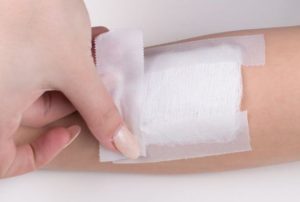 Are Boils Contagious from Person to Person?
Are Boils Contagious from Person to Person?
This is a great question that many people ask when they either know someone with boils, or have boils themselves. Either way, this discussion is important because spreading boils can be avoided in most cases.
In short, it is possible to spread boils from one person to another if the bacteria from the boil comes into contact with another person’s skin, and that person is susceptible to the infectious bacteria. More specifically, the common bacteria responsible for causing boils is known as staphylococcus (staph) bacteria. Not everyone who comes into contact with this boil will get a staph infection or a boil, but those who don’t have a tolerance to it may be susceptible. A tolerance to the bacteria depends on genetics, immune system, and other factors. Unfortunately, there’s no surefire way to know if you’re susceptible or not.
 However, it should be noted that most people do not get boils from someone else. They usually come from an infection that starts in the skin through a hair follicle or oil gland. The bacteria that causes the infection is usually already on the skin, but it has just had an opportunity to advance itself into the skin through a micro-cut or micro-scrape.
However, it should be noted that most people do not get boils from someone else. They usually come from an infection that starts in the skin through a hair follicle or oil gland. The bacteria that causes the infection is usually already on the skin, but it has just had an opportunity to advance itself into the skin through a micro-cut or micro-scrape.
How Long Are Boils Contagious?
There’s debate as to what point a boil is contagious. Some experts say it’s when it stops draining fluid, and others say it can remain infectious until it completely heals or scabs over. Since a boil is caused by bacteria, it is safe to say that a boil remains contagious as long as the boil-causing bacteria is on the skin. It’s best to play it safe and avoid contact with the infected area until completely healed.
Are Boils Contagious After Antibiotics?
Generally, it is believed that a person with boils (staph infection), is not contagious after 24 hours of taking antibiotics. However, it should not be assumed and you should still avoid contact with someone’s infection.
Can Boils Spread Sexually?
 Boils are not sexually transmitted. But this doesn’t mean you won’t get or spread a boil by having sex. The act of sex means your skin coming into contact with another person; therefore, the chances of the infectious bacteria spreading to vulnerable places of the other person is greatly increased. If you are going to have sex while you have a boil, be sure to keep it sealed with a bandage.
Boils are not sexually transmitted. But this doesn’t mean you won’t get or spread a boil by having sex. The act of sex means your skin coming into contact with another person; therefore, the chances of the infectious bacteria spreading to vulnerable places of the other person is greatly increased. If you are going to have sex while you have a boil, be sure to keep it sealed with a bandage.
Are Genital Boils Contagious?
Genital boils have the same chance of spreading to someone else as any other boil on your body. However, this means you should probably avoid having sex with someone who has a boil on or around their genitals since the shear act of sex means direct skin contact. The bacteria from the infected person will inevitably come into contact with the other person; and if the other person is susceptible to the bacteria, they can easily get an infection themselves.
Are Boils Contagious Before They Pop?
 Although an unpopped boil is still “sealed” in the skin, an unpopped boil can still contain the boil causing bacteria around the skin. It’s not as likely to spread infection, but technically – yes, it should still be considered contagious.
Although an unpopped boil is still “sealed” in the skin, an unpopped boil can still contain the boil causing bacteria around the skin. It’s not as likely to spread infection, but technically – yes, it should still be considered contagious.
Are Boils Contagious to Babies?
Babies are, in fact, more susceptible to boil causing bacteria since their immune systems are weaker than adults. Extreme caution should be used when interacting with babies if you have a boil. Be sure to wash your hands thoroughly before picking up a baby, changing their diapers, or touching their bedding and other surfaces they come into contact with.
Are Boils Contagious in Swimming Pools?
 If you find yourself swimming in a pool with someone who has boils, it’s not likely you’ll a boil yourself. The chemicals in most pools, such as chlorine, will typically kill the bacteria before it makes it to you. As a precaution, you should always bathe after swimming, and wash your towels and bathing suit with detergent in hot water to get rid of any potentially infectious bacteria.
If you find yourself swimming in a pool with someone who has boils, it’s not likely you’ll a boil yourself. The chemicals in most pools, such as chlorine, will typically kill the bacteria before it makes it to you. As a precaution, you should always bathe after swimming, and wash your towels and bathing suit with detergent in hot water to get rid of any potentially infectious bacteria.
How to Prevent Spreading Boils
 1.) The number one way to prevent spreading boils to someone else is to keep your boil covered with a bandage at all times so no bacteria from the infection spreads to any other persons or surfaces that someone else may come into contact with.
1.) The number one way to prevent spreading boils to someone else is to keep your boil covered with a bandage at all times so no bacteria from the infection spreads to any other persons or surfaces that someone else may come into contact with.
2.) You can also ask your doctor to prescribe you some antibiotics. Generally, antibiotics will help remove the contagious element from your infection so you’ll be less likely to spread infection to another person.
3.) Avoid sharing razors, towels, sheets, sporting equipment, or other items that come in direct contact with someone’s skin.
4.) Practice good hygiene, such as showering your entire body at least once a day, and washing your hands thoroughly throughout the day.
